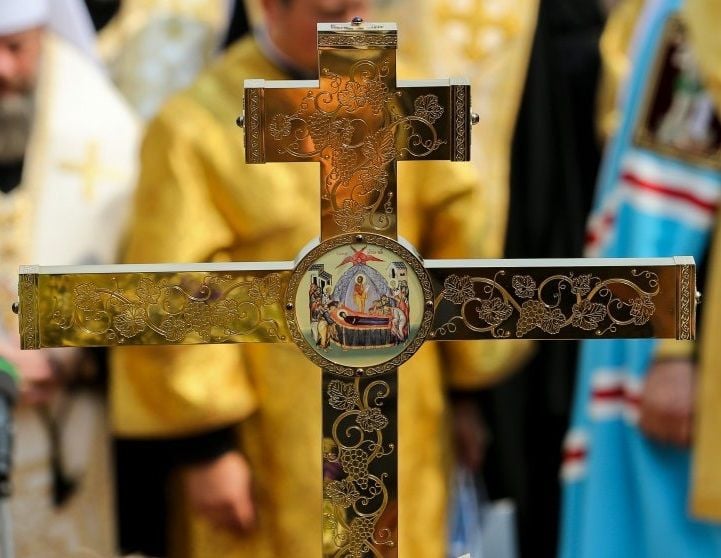
Ukrainian President Petro Poroshenko announced on April 17 that Ukraine might have an independent, unified Ukrainian Orthodox Church as early as July 28—the anniversary of Kyivan Rus’ adoption of Christianity.
He made the prediction after the Ukrainian parliament voted to support the president’s efforts to convince Ecumenical Patriarch Bartholomew to grant autocephalous status to the combined Ukrainian Orthodox Church (UOC)-Kyiv Patriarchate and Ukrainian Autocephalous Orthodox Church, John Coyle wrote in an op-ed for the Atlantic Council.
During an official state visit to Istanbul, Poroshenko met with Patriarch Bartholomew on April 17. The two leaders held seven hours of closed-doors discussions before the president announced “Ukraine is as close as ever to the emergence of its own Unified Orthodox Church.”
Ukrainian nationalists have been trying to establish an autocephalous church since 1992, when Patriarch Filaret broke with the Moscow Patriarchate and established his own congregation, the Ukrainian Orthodox Church-Kyiv Patriarchate. The Moscow church banned Patriarch Filaret, excommunicated him, and eventually declared him anathema for his action. For the nationalists, however, it is a question of politics, not theology.
“Unity is our main weapon in the fight against the Russian aggressor," Poroshenko told the parliament. “This question goes far beyond the ecclesiastical. It is about our finally acquiring independence from Moscow.”
Read alsoRFE/RL: Ukrainian Orthodox Church under pressure in CrimeaPoroshenko pointed out that the Kremlin regards the Moscow Patriarchate as “one of the key tools of influence over Ukraine.” His thoughts are echoed by Archbishop Zoria Yevstratiy of the Kyiv Patriarchate, who said that the differences aren’t about faith. “Moscow is using its influence over Ukraine in the church as an instrument of hybrid warfare against Ukraine,” said the prelate.
The author notes that within Ukraine itself, the Kyiv Patriarchate is clearly winning over their Moscow-controlled counterparts.
As expected, the bid for independence from the Moscow Patriarchate faces stiff ecclesiastical opposition from the Moscow church. They point out that Moscow annexed Kyiv’s Metropolitan in 1686, and that Ukrainian clerics are therefore under Moscow’s authority, and not Constantinople’s. Ecumenical Patriarch Bartholomew therefore lacks the authority to grant Ukraine an independent status.
Archbishop Yevstratiy dismisses these arguments. He claims that the 1686 annexation was accomplished by use of force, already a violation of canonical law. He recalled that the ecumenical patriarch had granted autocephaly unilaterally to Orthodox churches in Estonia in 1996, Bulgaria in 1998, and the Czech Republic and Slovakia in 2014. Thus, “the practice of granting Tomos (an official Church declaration) on autocephaly by Constantinople in the nineteenth and twentieth centuries confirms that the Ecumenical Patriarchate alone makes this decision, without the need for prior agreements with other Churches.”
Read alsoUkraine's parliament backs appeal to Bartholomew to create independent UOC"What happens among the various Orthodox communities is worth watching, as it impacts questions of Ukrainian sovereignty, the influence of Moscow, and the ecclesiastical legitimacy of the congregations. Poroshenko’s July 28 deadline might be rushed, however," the author wrote.
To avoid making a decision on autocephaly, the Ecumenical Patriarch referred the recognition question to a study group two years ago. Without additional knowledge of what occurred between Patriarch Bartholomew and the president, it is impossible to state with any certainty if the patriarch has come to a decision.
As UNIAN reported earlier, on April 22, The Holy and Sacred Synod of the Ecumenical Patriarchate has accepted an appeal by President Petro Poroshenko and Ukrainian Orthodox clerics on granting autocephaly to the Ukrainian Orthodox Church and "made corresponding decisions."
On April 19, the Verkhovna Rada of Ukraine endorsed the appeal to Patriarch Bartholomew on granting autocephaly to the Ukrainian Orthodox Church. The only political forces refusing to support the move were the Opposition Bloc and Vidrodzhennia Group.

